Hi! Welcome to Gasgoo. In today's episode of "Wheels of Change: Stories of Chinese Auto Giants," we're diving into the story of a new, fiercely competitive player in the market—Leapmotor.
Leapmotor: Targeting the Underserved Markets Through Persistence
2015 marked a year of rapid growth for China’s new-energy automakers, and Mr. Zhu Jiangming, a key founder of Dahua Technology, recognized the momentum in the electric vehicle (EV) sector, launching his second entrepreneurial venture into this field.

Photo credit: Leapmotor
On December 24, 2015, Leapmotor was officially founded, embodying a dual vision of building cars from "zero" and pursuing "zero" emissions.
Leapmotor's founding team mainly came from Dahua Technology, with initial funding provided by the parent company. Dahua, a leading player with over two decades of expertise in digital intelligence, had extensive experience in fields such as intelligent transportation and automotive electronics. This background accelerated Leapmotor's product development, channel expansion, and branding efforts. Mr. Zhu's technical background, spanning nearly 30 years in electronics and AI-based product development, established Leapmotor's core focus on self-developed technology.
In 2017, Leapmotor launched its first factory in Jinhua, Zhejiang Province.
With an investment of 2 billion RMB and covering an area about 380,000 square meters (570 mu), construction of the factory began in July 2017 and completed in 2019, with production commenced in 2021. The facility, featuring four workshops and five flexible production lines, allows the production of up to four car models on a single platform, with a designed annual output capacity of 250,000 vehicles. Currently, the Jinhua plant is capable of producing up to 30,000 vehicles per month.
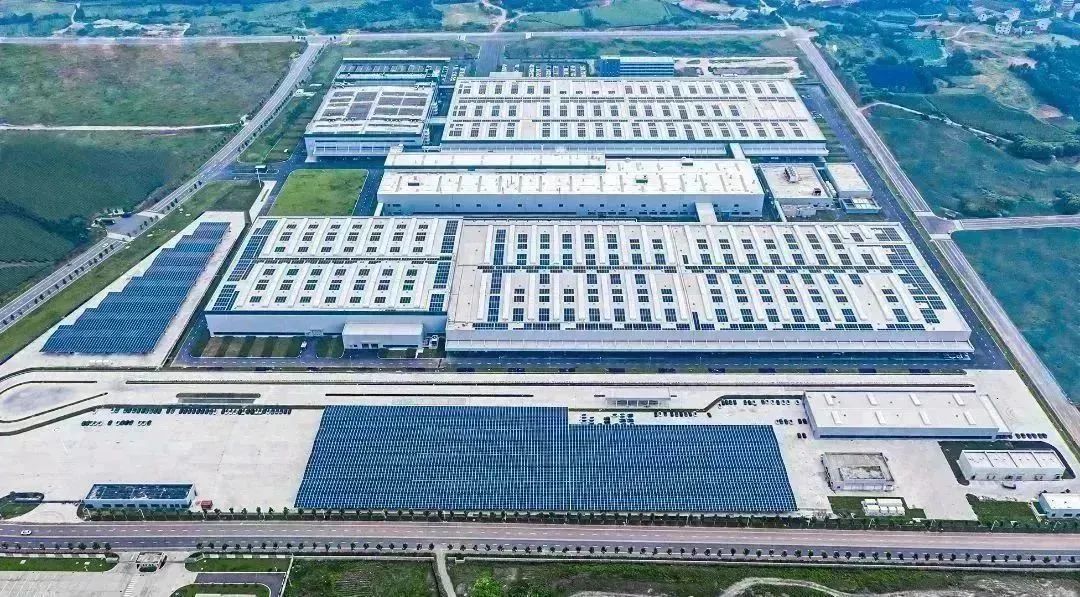
Jinhua plant ; photo credit: Leapmotor
In January 2019, Leapmotor's first self-developed vehicle model, the all-electric coupe S01, was introduced at a starting price of 119,900 RMB. Despite the post-subsidy price dropping to around 100,000 RMB, the S01 struggled due to its niche appeal, as consumers increasingly favored SUVs at that time. Coupled with limited marketing efforts and experience, the S01 faced poor sales, selling fewer than 1,000 units in its debut year and ultimately being retired in 2022.
The S01's failure pushed Leapmotor into a low point, with severe financial strain. Rumors circulated that the company's leadership was considering abandoning the automotive venture altogether. However, Mr. Zhu Jiangming opted to persevere, targeting more affordable markets and prioritizing cost-effectiveness to sustain the business.
By 2020, Leapmotor regrouped, achieving a comeback with its second model, the T03, a long-range, intelligent electric microcar. Known for its exceptional affordability and advanced smart features, the T03 quickly gained popularity and accounted for a significant portion of Leapmotor's sales.
The T03 became the first A00-segment all-electric vehicle on the market to offer Level2 intelligent driving assistance, with a comprehensive post-subsidy price under 80,000 RMB. The T03 emphasized affordability without compromising quality and adopted a more robust marketing approach. In just over half a year following its market launch in 2020, the T03 realized sales of 10,300 units, with cumulative sales now exceeding 150,000 units.
The success of the T03 solidified Leapmotor's commitment to a cost-driven pricing strategy, aiming to offer products with high value for money. Mr. Zhu later refined Leapmotor's approach, aspiring for it to be a brand delivering high-quality, well-equipped products at accessible prices.
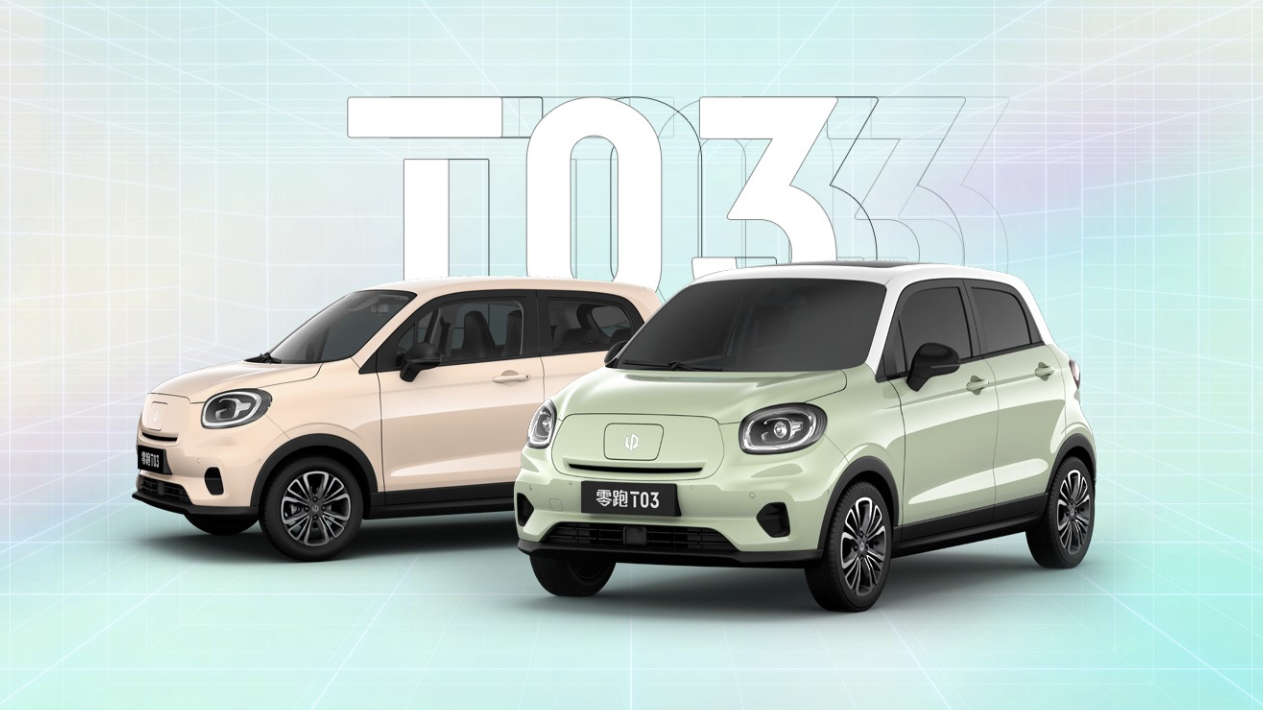
T03; photo credit: Leapmotor
Subsequent vehicle models have focused on the mainstream price range of 100,000 to 200,000 RMB, leveraging Leapmotor's in-house technology to continually lower prices and drive up sales.
According to Mr. Zhu, "In today's era of mainstream new energy vehicle (NEV) adoption, Leapmotor aims to redefine the value standards for cars priced between 150,000 and 200,000 RMB." By 2025, Leapmotor anticipates that NEVs within this range could account for over 25% of the auto market, making it a strategic focus.
The NEV market leaves little room for error. After the S01's struggles, Leapmotor adopted a more practical, well-planned product strategy, making cautious decisions at every step. This led to several pivotal moves in 2020.
Leapmotor built a comprehensive marketing system, drove sales growth, and increased production capacity, not only turning the tide with the T03 but also breaking new ground in production licensing, financing, and IPO efforts in 2020.
In 2020, Leapmotor acquired the production qualifications by purchasing Fujian New Forta Automobile Industry Co., Ltd. On April 30, 2021, it received official independent production approval from China's Ministry of Industry and Information Technology (MIIT). Previously, Leapmotor's models were manufactured through a partnership with Hangzhou Changjiang Automobile.
The rollout of the first in-house produced T03 from the Jinhua factory in July 2021 marked the completion of Leapmotor’s final manufacturing puzzle piece, establishing it as a full-stack automaker with capabilities in intelligent vehicle development, production, sales, and service.
With its growing influence, Leapmotor attracted increased interest from investors. For any emerging automaker without the ability to generate substantial self-sustaining revenue, funding is as critical as production and sales.
At the end of 2020, Leapmotor secured over 4 billion RMB in committed funding, closing a 4.3 billion RMB Series B finacing in early 2021, which was 13 billion RMB over-subscribed. Dahua Technology chairman Mr. Fu Liquan and Mr. Zhu Jiangming also increased their stakes. With continued support from capital markets, Leapmotor pursued an IPO, paving the way for ongoing product and market expansion.
On September 29, 2022, Leapmotor debuted on the Hong Kong Stock Exchange, becoming the fourth NEV startup listed after XPENG, Li Auto, and NIO. This was also the largest IPO on the Hong Kong exchange that year, raising a net amount of 6.06 billion HKD. Leading up to the IPO, Leapmotor had raised over 8.8 billion RMB in 2021 alone through multiple funding rounds.
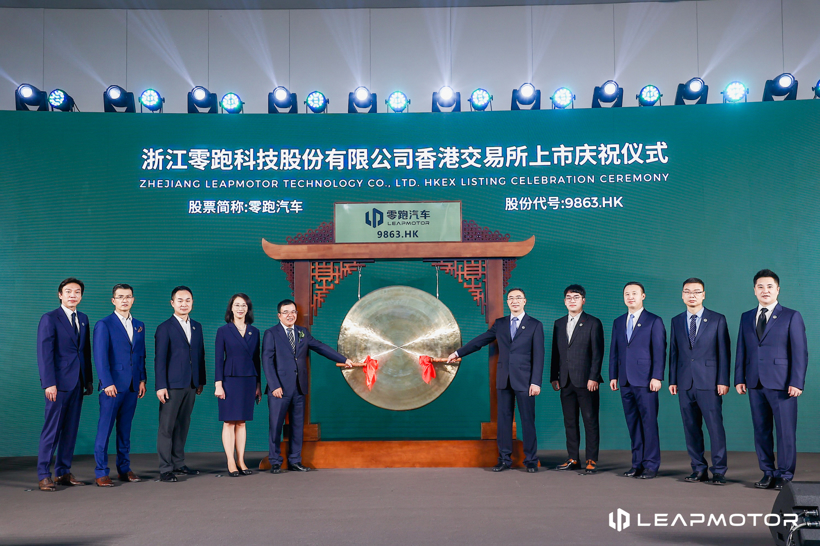
Photo credit: Leapmotor
However, the IPO journey wasn't smooth; Leapmotor's stock fell 33.5% on its debut day, reflecting market concerns. Mr. Zhu Jiangming remained unfazed, emphasizing Leapmotor's focus on product quality and rapid market share acquisition. The results have since validated this steady approach.
As global markets entered a downturn in 2022 and automotive financing began to wane, IPO hurdles intensified. Several competitors, like WM Motor and Aiways, failed to secure IPOs. Lacking capital support, their outcomes were less fortunate.
In contrast, Leapmotor's IPO success stands out as remarkable. According to Tianyancha, Leapmotor has completed ten financing rounds to date, raising over 31.5 billion RMB from a diverse pool of investors, including HongShan Capital Group, the Hefei government, Hangzhou state-owned capital, CITIC Securities, CICC Capital, Shanghai Electric, and more.
Eight Years to Join the Forefront of China's New Energy Auto Makers
In the rapid arena of NEV, speed almost means everything. As sales rose, production licenses were secured, and financing activities progressed alongside going public, Leapmotor tightened its product development focus.
In 2021, Leapmotor unveiled its third vehicle model—the C11, a mid-size intelligent all-electric SUV. This launch marked the beginning of Leapmotor's 2.0 era, signifying its ambition to compete within the top ranks of China's new energy vehicle sector.
The C11, officially hit the market in September 2021 and began deliveries in October, quickly gained popularity in the mid-size new energy SUV market. It offered standard intelligent driving assistance across 22 features, the longest battery-powered range in its class, and an attractive price point of around 200,000 RMB.
In its debut year, the C11 achieved sales of 4,678 units, and demand only continued to grow. By 2022, sales of the C11 had reached 43,970 units, and in 2023 nearly doubled to 80,616 units, setting a new benchmark for vehicles in the 150,000-200,000 RMB range.
With the success of its mainstay models, the T03 and C11, Leapmotor delivered approximately 43,700 NEVs in 2021, which shot up 443.5% from the previous year.
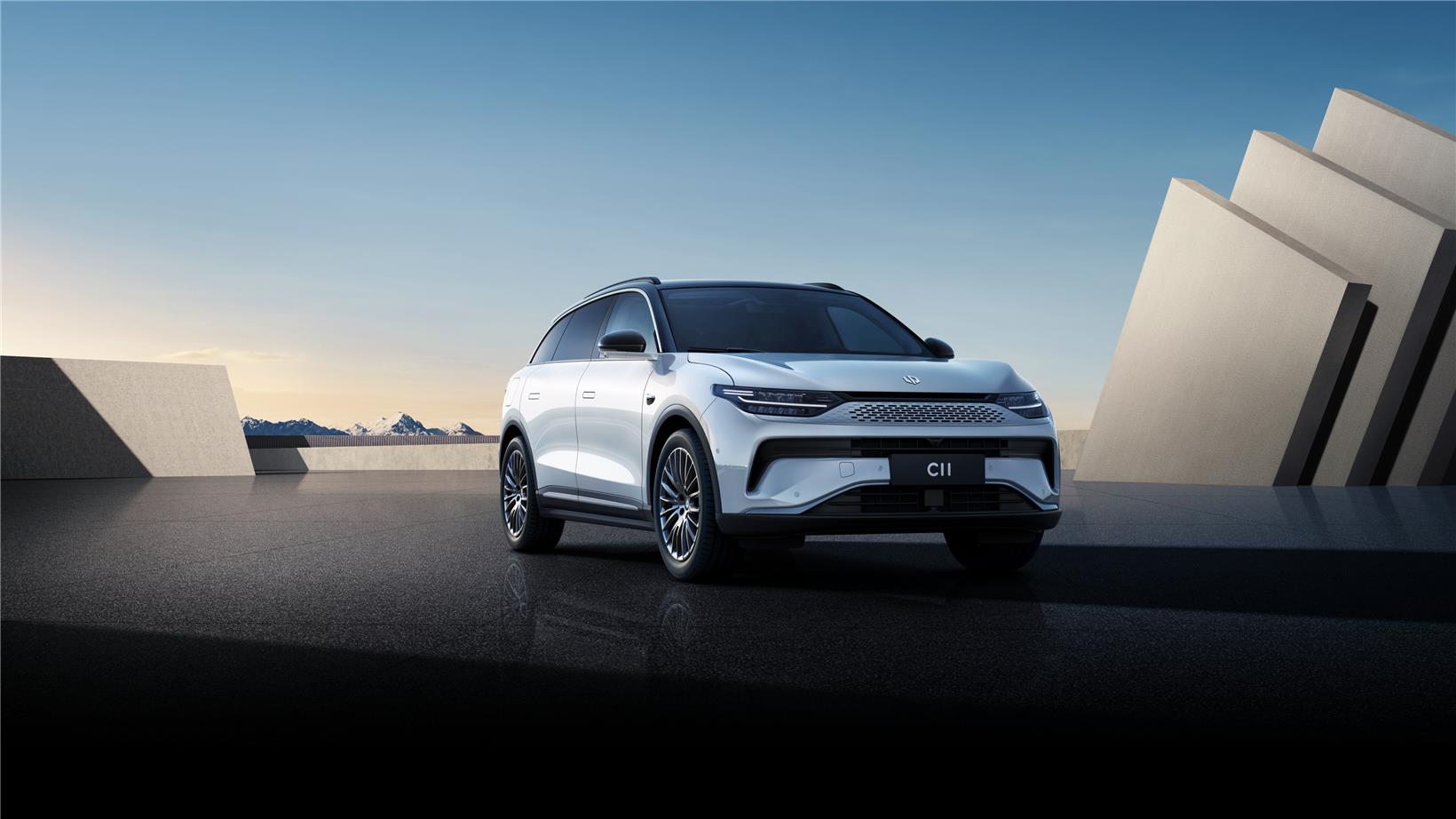
C11; photo credit: Leapmotor
According to its development strategy at that time, Leapmotor planed to release 2-3 new models annually, spanning sedans, SUVs, and MPVs powered by either all-electric (BEV) or range-extended (REEV) systems, with a goal of selling 800,000 vehicles annually by 2025.
To meet these targets, Leapmotor was accelerating its model release rate and expanding production capacity. Construction of its second factory—the Qiantang facility in Hangzhou—began in 2022, aiming for an annual capacity of 200,000 vehicles and focusing on smaller models to complement the C-series lineup produced at the Jinhua facility.
In May 2022, Leapmotor launched its mid- to large-sized intelligent all-electric sedan, C01. In March 2023, the C11 extended-range model debuted, marking the official start of its "dual power" strategy with REEV and BEV options. Leapmotor set a new trend with the C11, making mid-size new energy SUVs accessible for under 150,000 RMB. Later in the year, new editions of the C01, C11 EV, and T03 models were introduced, continuously driving prices down and value up.
In November 2023, Leapmotor introduced its first globally-oriented model, C10, preparing for its entry into overseas markets. Officially hit the market on March 2, 2024, the C10 signified Leapmotor's 3.0 development era, strengthening its lineup with the refreshed C11, C01, and T03 models. As of January 2024, the C10 had received over 45,000 pre-orders in two months, positioning it as a sales cornerstone.
On June 28, the new C16 SUV went on sale with both BEV and REEV power options. Positioned as a standard mid- to large-sized SUV, the C16 offers large space, comfort seating, Qualcomm 8295 chip, LiDAR sensor, a large infotainment screen, and 800V fast-charging, all within a price range of 155,800 to 185,800 RMB—aggressively competitive.
With the C11, C10, and C16, Leapmotor has established a robust SUV lineup, often considered affordable alternatives to Li Auto's vehicle models. These models target family-oriented buyers, mirroring Li Auto's Li L6, L7, and L8 series but at a much lower price point. Leapmotor has never shied away from comparisons with Li Auto, emphasizing its strategy of delivering high-spec vehicles at a lower cost, with a primary focus on creating popular models to boost brand awareness and store traffic.
With a precise value-driven market position, Leapmotor has rapidly expanded its lineup, refining its product platforms—the S, T, and C series. Especially with the strengths of the C series, Leapmotor is advancing toward the leading ranks of new energy vehicle brands in China, offering high-value models and advanced technology.
In June 2022, Leapmotor achieved the production milestone of 100,000 intelligent electric vehicles in just three years. In July 2024, Leapmotor's cumulative production volume hit the 400,000-unit mark.
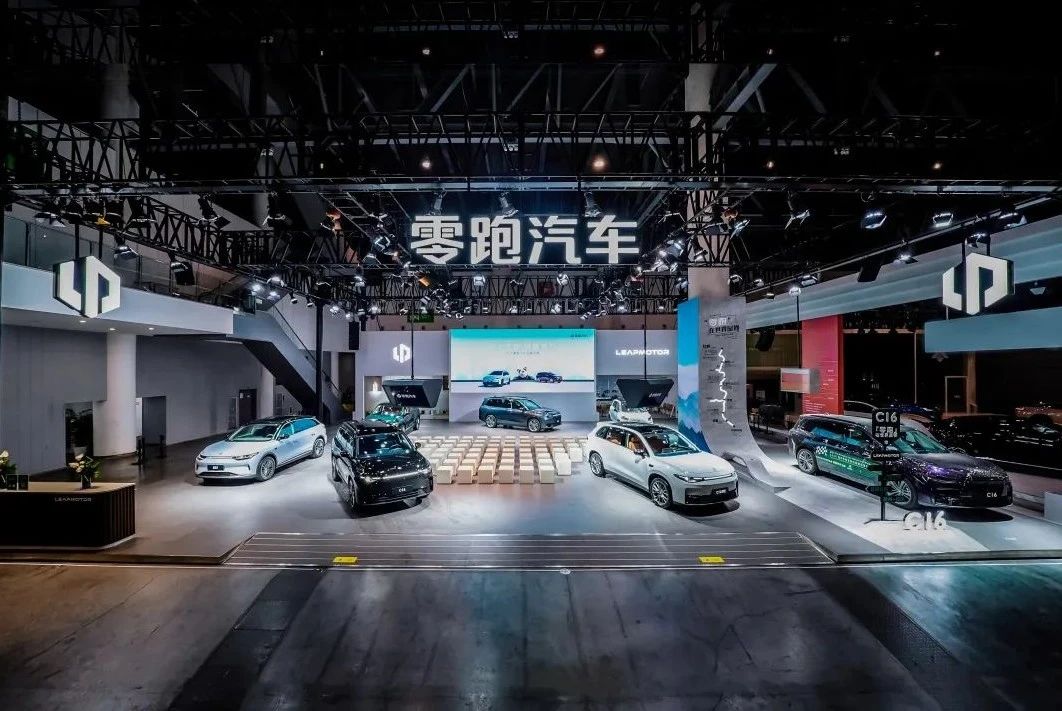
Photo credit: Leapmotor
In 2022, Leapmotor's annual deliveries reached 111,100 vehicles, a year-over-year surge of over 154%, placing it fifth among NEV startups in China. In 2023, despite challenges from theprice war, Leapmotor achieved annual sales of 140,000 vehicles, which grew 119% year on year, entering the top-three list just behind Li Auto and NIO.
From a relatively unknown second-tier player to a frontrunner, Leapmotor achieved this rise in eight years.
This upward trajectory has fueled Leapmotor's ambitions, setting a 2024 sales target of 250,000-300,000 vehicles.
In October 2024, Leapmotor achieved a record-breaking monthly delivery volume of 38,177 vehicles, marking a 109.7% year-on-year soar. In the first ten months of this year, Leapmotor’s cumulative deliveries amounted to 211,038 vehicles.
At its current growth rate, boosted by the C16's success, Leapmotor is poised to emerge as a dark horse in the second-half of this year, potentially forming a competitive lineup with Li Auto and AITO.
However, Mr. Zhu Jiangming remains very modest about these achievements, describing Leapmotor as the "tortoise" among Chinese NEV startups, aiming for steady progress. He emphasizes a focus on long-term quality rather than rapid gains, with the goal of reaching world-class standards in technology and production.
This cautious, practical philosophy defines Leapmotor's products and strategy. Instead of stacking cool features for competition's sake, Leapmotor keeps a grounded approach to pricing, configuration, and technology. For example, after observing that 500 km meets mainstream range demands and that 700 km models don't perform as well in sales, Leapmotor excluded the 700 km option. The company also believes that its urban intelligent driving tech is not yet timely for full rollout, focusing on refining existing assisted driving functions instead. Despite AI and large model trends, Leapmotor refrains from adopting these technologies prematurely.
In future planning, Leapmotor seeks both speed and stability.
The current focus is on strengthening the C series products. Next year, Leapmotor will introduce the budget-friendly A series, priced around 100,000 RMB, while expanding offerings in the 150,000+ RMB range to reach steady monthly sales of 30,000 vehicles. By 2025, three B-series models priced between 100,000-150,000 RMB are expected to hit the market, with a D series targeting the 200,000 RMB range anticipated in 2026.

B10; photo credit: Leapmotor
Leapmotor is also ramping up channel expansion in the second half of this year. Mr. Zhu explains that Leapmotor will adopt a "1+N" model, combining direct sales with a franchise network to extend its reach. Currently, Leapmotor has over 500 stores, with plans to expand to 800 by the end of 2024.
联系邮箱:info@gasgoo.com
求职应聘:021-39197800-8035
简历投递:zhaopin@gasgoo.com
客服微信:gasgoo12 (豆豆)

新闻热线:021-39586122
商务合作:021-39586681
市场合作:021-39197800-8032
研究院项目咨询:021-39197921
